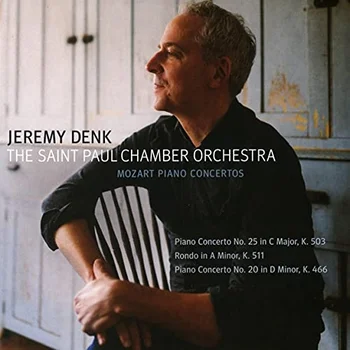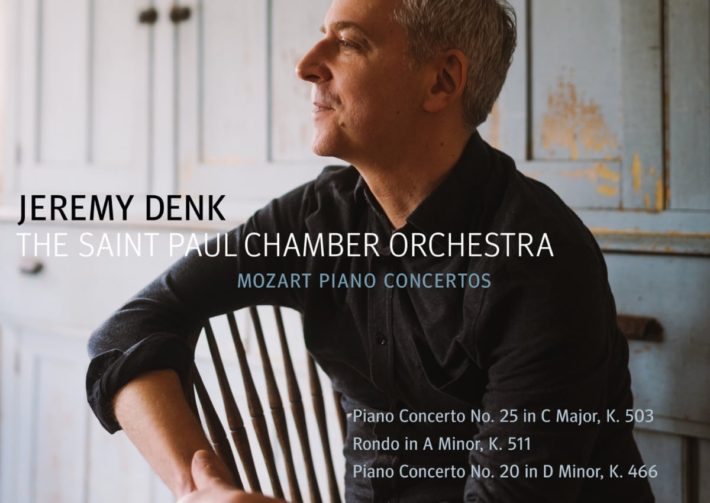I first learned of Jeremy Denk after hearing him interviewed on National Public Radio. He had just won the MacArthur “Genius” Fellowship (2013) and I quickly sought out his recording of Bach’s Goldberg Variations, a deeply satisfying reading on both an intellectual and emotional level. His last recording, c.1300–c.2000 (released in 2019 and reviewed here), is an eclectic exploration of the entire history of western classical music, through performances of twenty-four pieces by composers ranging from Machaut to Ligeti. This newest album may not be quite as ambitious, but it features striking readings of two of Mozart’s most popular piano concertos.

Denk’s characteristic flair and intelligence is evident throughout the album. Fast passagework is always clearly articulated and well-shaped. Balance between the hands is exemplary, as is the voicing of the piano‘s contrapuntal lines. Cadenzas offer moments of thrilling virtuosity and imagination. Energy is an essential ingredient for each reading – even slow movements have a definite sense of forward momentum. Mitsuko Uchida’s second recording of the slow movement of (Cleveland Orchestra/Decca) from K. 503 takes over a minute longer (8’23” versus 7’18”). But listening to Uchida’s performance after Denk’s, one senses how her overly developed Romantic lyricism tends to weigh down Mozart’s limpid filigree. Like Uchida, Denk draws subtly varied colors from his instrument, but he knows that Mozart‘s music does not need to be overly interpreted to reveal its full emotional meaning. Brautigam’s performance on fortepiano, accompanied by Kölner Akademie on BIS, is equally successful for the same reason.
Orchestral execution is excellent throughout. The performance style is clearly based on historically informed performance practice: accents are sharp, fast passagework is played with a pleasing lightness and clarity, with vibrato sparingly used. Winds are recorded well-forward, the timpani played with wooden sticks. The orchestra plays with zest and enthusiasm, and there is a clear sense of communication and interpretative agreement between pianist and ensemble. The expositions of the outer movements have an infectious energy that sets the stage perfectly for Denk’s initial entrances, while the solo wind playing in both slow movements offer refinement and sensitivity.
In between the two concertos is Mozart’s “Rondo in A minor,” K511. On his webpage Denk writes that this music is “about the nature of melancholy, a sadness (if you like) about sadness.” The writing is highly chromatic, its melodic line featuring several moments of ornate embellishment. Denk’s performance has a clear sense of structure, and he masterfully captures the music’s many quick-silver mood changes. The reading certainly finds a vein of sadness that remains with the listener long after the final notes sound.
The recording of Concerto No. 25 is bright and a little airless; a tad more room ambiance might have provided more warmth for the orchestral sound. The recording of Concerto No. 20 is more successful, and was apparently recorded before a live audience, though they are incredibly quiet throughout the work until their enthusiastic applause begins before the final chord has died away.
There are, of course, several dozen recordings of each of these works. But it would be difficult to find performances more accomplished and energetic than these. Even if you already own several recordings of this repertoire, Denk’s performances give us yet another prism through which to appreciate and love these masterpieces of the classical piano repertoire.
Recommended Comparisons
Uchida | Brautigam | Bavouzet | Barenboim
Mozart – Piano Concertos
Jeremy Denk, piano/conductor
The Saint Paul Chamber Orchestra
Nonesuch Records, CD 7559791687



















